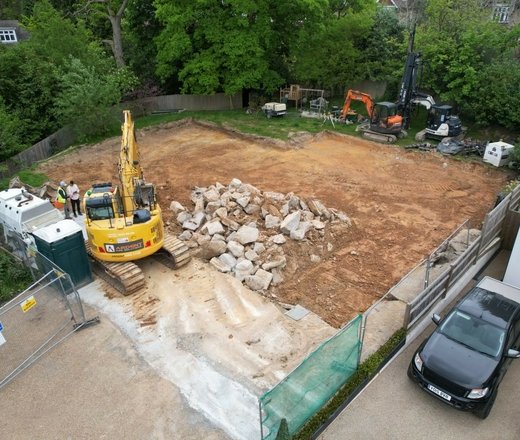Self-building gives you the chance to create a totally bespoke custom-built home but it doesn’t come without its challenges. Our founder, Deborah Richards, is currently working on her own exciting newbuild project in Tunbridge Wells and shares her helpful tips for preparing for a demolition of an existing property on your site.
What happens when you need to demolish an unwanted property?
Demolition is the process of dismantling a building by pre-planned or regulated methods, but there’s more to a demolition than just swinging a wrecking ball. There is a process that leads up to it which is incredibly important to follow.
- Pre-demolition requirements
Demolition is dealt with under the Building Act 1984. So, you must file a demolition notice to inform your Local Authority Building Control six weeks in advance of your intention to demolish. They will then specify pre-demolition requirements, which may include shoring, protection of adjacent buildings against damage, collapse or water damage, debris-disposal and safety measures.
- A detailed survey is then conducted
A survey is needed to examine the different characteristics of the building, such as the materials, building usage, method of construction, condition, draining conditions, traffic conditions, building codes, and neighbouring communities. The study of these parameters is carried out to dictate the best demolition method.
- Removal of hazardous materials
As you can imagine, checking for hazardous materials is a vital step of this process. Hazardous materials, which could include asbestos, radioactive substances, flammable materials or petroleum contamination, will be picked up in your demolition survey. Specialists will then remove these dangerous substances from the site before the demolition begins.
- Secured power to the site
UK Power Networks will need to visit your house to complete a survey, which will cover cutting off the power to the main property and giving guidance to prepare for the safe installation of a temporary power supply, which the builders will want to use when on site. Instructions will include how to build a trench from the original house to the new temporary power box, which you will need to provide.
You might also need to turn off your gas supply too; each site is unique. The gas network is served by different regional operators, so find out who covers your area and advise them of your requirements.
Let’s talk health and safety
If you don’t have a principal contractor running your build, like Deborah, then you are deemed to be the Principal Contractor, and will be held responsible for the health and safety of the site. This means that you must comply with the Construction (Design and Management) Regulations 2015 and you are accountable for creating a construction phase plan CPP, a document which details the health and safety risks associated with the construction phase of the project and the control measures that will be implemented to minimise risks or where possible, eliminate them.
Under the CPP, you will have to keep a register of contractors, check their own risk assessments and method statements, and they will have to sign in and out every day. You are also responsible for their welfare and will have to make sure there is a toilet, running water, first aid and an office for them on site. You will need to ensure that the right protective fencing is in place, with the required notices, and last, but not least, you need the right site insurance in place.
With so many aspects to cover, you may like to take the pressure off and consult with someone experienced and knowledgeable about this side of the process. Then you can be reassured that this crucial stage of your project runs smoothly. Deborah has a wonderful contact who is managing all of the health and safety on her site and would be happy to pass on the details to anyone interested.
We hope this gave you a better insight into the process that takes place before a demolition. Keep your eyes peeled for some more new-build updates and tips from our founder, Deborah Richards.
If you would like friendly, professional guidance on selling or letting your home, why not contact our fabulous Maddisons Residential team. We would love to help your property reach its full sale-price potential.
Market your property with Maddisons Residential
For many, the first point in their house moving journey, is to understand the value of their current home. Whether you want a quick, instant, online indication, or a more robust property specific and individual valuation, we would be delighted to help.





